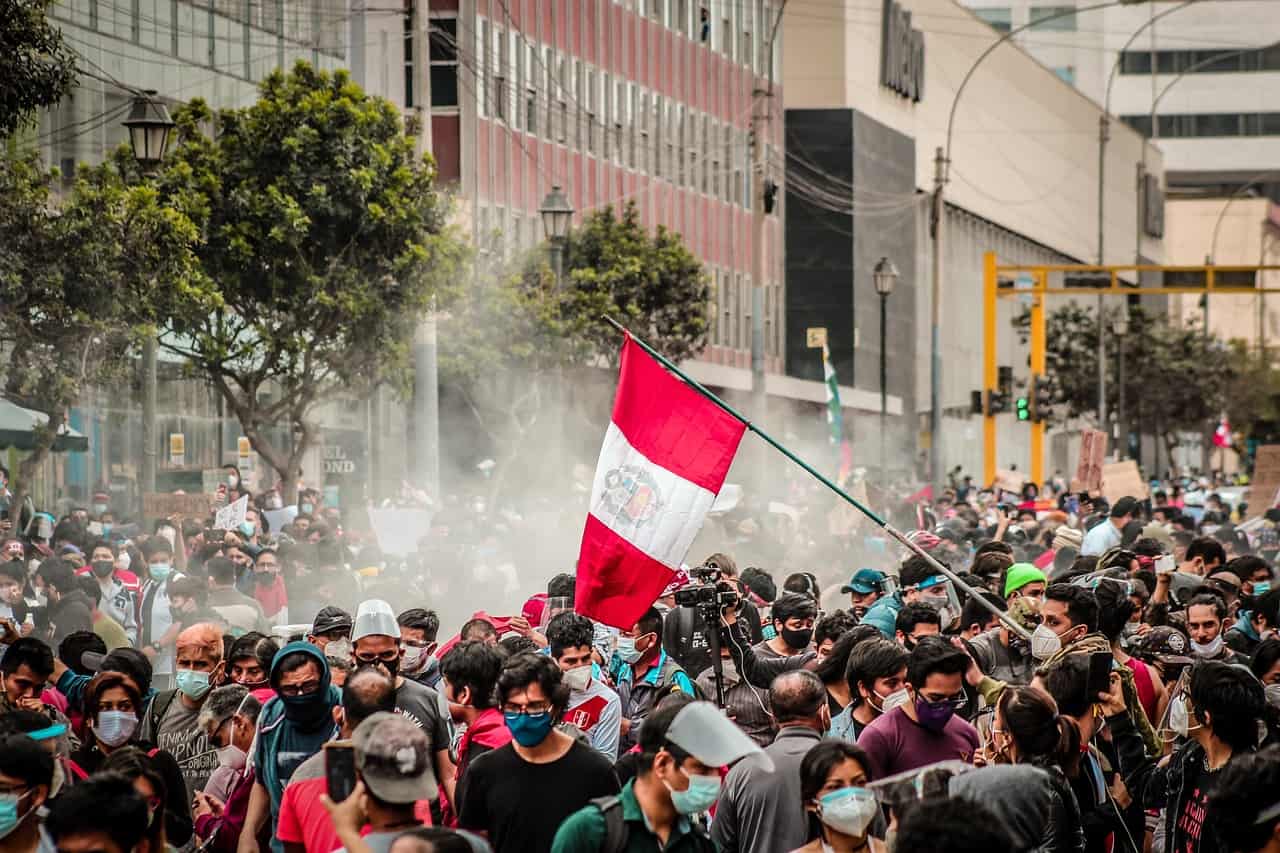Una versión en español de este artículo está disponible aquí.
Translation from the original Spanish by Orlando Portalatin, SJ.
The context of the tragedy
To speak about the Peruvian context is complex. It is even more so after a series of political and social events that have transpired in recent weeks. On December 7, 2022, facing an impeachment vote by the opposition-controlled Congress, President Pedro Castillo unconstitutionally ordered the dissolution of Parliament, the suspension of the judiciary and of the autonomous institutions of the Peruvian state. In short, a self-coup attempt.
Congress defied him and removed him from office. The Castillo government, like previous Peruvian rulers, has been widely questioned for alleged acts of corruption. Before he was able to secure asylum at an embassy, he was detained. Soon after his removal from office and his arrest, Congress swore in his vice-president as the new president. These events gave rise to a series of protests throughout Peru. Among the multiple demands being made were: the closure of Congress, the removal of the newly-appointed President Dina Baluarte, the establishment of a constitutional assembly, the calling of new general elections, the reinstatement of Castillo in office, etc. These demands led to a series of demonstrations in the squares of the cities of southern Peru, the closure of highways, airport seizures, etc.
The State responded by declaring a state of emergency in some cities of Peru. These measures effectively suspended some of the basic rights of citizens: the rights to gather and travel freely and the right of privacy in the home. The military assumed the authority to enforce these measures, allowing the police to search homes without a warrant. To date, the protests and the disproportionate response of the state have resulted in the death of more than 50 citizens and multiple people injured.
Repeat the violence
A few weeks ago, Director of Mental Health Dr. Yuri Cutipé, in a speech at an award ceremony and in the midst of the country’s social and political chaos, stated that “we are killing one another in Peru.” His words reminded me of one of the testimonies collected by anthropologist Kimberly Theidon in “Intimates Enemies: Violence and Reconciliation in Peru” in her work about the internal armed conflict and the policy of reconciliation in Peru during the 1990s:
“We knew the Cayetano family had been giving food and lodging to the terrucos (members of Sendero Luminoso, a terrorist organization in Peru from 1980-2000). In their house up on the puna (a plateau), they let the terrucos spend the night. We knew what the soldiers would do if they found out. We knew we had to stop that. So we rounded up the family one night, all but the youngest child, and took them down to the river below. We hung them all that night and dumped their bodies in the river. That’s how we learned to kill our prójimo (fellow brother or sister).”
The testimony gives an account of a culture of violence that arose within the communities affected by the internal armed struggle in Peru between 1980 and 2000. 1 These dynamics of violence fractured relations at all levels in the country. Not only were members of terrorist groups and the armed forces the ones who caused the violence, but also there were civilians who were immersed in the cycle of violence. We killed our brothers and sisters several decades ago, and we are still killing them today. Why is there violence among fellow citizens? And why do we look away when brothers and sisters are being harmed or murdered? Why do we constantly rely on violence?
Antigone and the transgression of violence
The deaths caused by the current political unrest – especially those in the regions of Ayacucho and Puno – reminds me of the tragedy of Antigone. 2 The reason is that the dynamics questioned by Sophocles are similar to the ones at play in the current conflict.
Polynices, one of Antigone’s brothers, has betrayed his homeland and fights Eteocles to seize power. But both brothers die in battle simultaneously, one at the other’s hands. Because of the betrayal, the king at the time does not allow Polynices’ body to be buried. Even in death, Polynices is stigmatized and condemned to repudiation. Despite the prohibition and the stigma, Antigone transgresses the law and secures a respectable burial for her brother. Even though he was a traitor, she did not rage against him. Instead, she assumed a new kind of justice that valued her two brothers equally. It is important to highlight Antigone’s response because it is a way of transgressing violence. In José Watanabe’s version, Antígone shouts:
How to enter dancing and singing in the temples if on the hardest hill there is a body without burial?
How to toast, erasing from my eyes what they don’t see but what is it really?
It is a corpse surrounded by guards, guarded day and night so that not even the wind covers him with earth.
But if you are a dog or a vulture you can get and tear it apart and bite into the precious flesh of my brother
My brother, but no longer a relative of mine but dead of all, tell me what should I do.
The scene condenses in the tragedy – in the pain experienced by Antigone – the pain shared by so many today. Antigone becomes a model against violence for all of us. The death of our brothers and sisters summons us; it calls us as a society to look back and not evade nor deny nor exploit the deaths of our fellow citizens. In a country where injustice is rampant, we have to turn our gaze to those who are different, to those who have died outside of Lima, to those from Abancay, to those from Ayacucho, to those from Chala, to those from Puno. Like Antigone, we are called to embody a new kind of justice that values our brothers and sisters equally; we are invited to say no to violence.
Whoever has ears, let them hear
You can swear, king, that your throne is on broad marble bases.
I see him on the edge of an abyss.
Sophocles criticizes any kind of discourse that justifies violence. The previous quote is from the wise voice of old Tiresias addressed to the king at the time. His words resonate today as we are invited to rethink the foundations from where we can build a country grounded in justice: not from killing one another, never from power, never from force, never from violence.
Whoever has ears, let them hear. (Mt. 13) Jesus told his followers this after narrating a series of parables. The phrase invites us to reflect, to seek the depth of the evangelical message, and to listen critically to reality. Unfortunately, the violence experienced in Peru or the tragedy of Sophocles continue to be parables that teach and demand other ways of living, other ways of understanding coexistence. Whoever cannot hear that so many deaths are a cry – a demand for a different way of coexisting – will allow for the killing of one another to continue.
The different way of coexisting to which I am proposing is the one announced by Jesus in the Gospel, whose central message is the promotion of a culture of encounter, a culture that unites and engages in dialogue. This different way of coexisting is that of the Kingdom of God; it is not a place where wounds are open and lives are separated, but a society that heals and builds bridges.
Image from Alex Phillc on Pixabay.
- According to the Truth and Reconciliation Commission established by the Peruvian State, this period of violence has been the longest and most harmful in the history of Peru. Up until now, 60,000 deaths and more than 21,000 disappearance have registered. Most of the victims were from rural and impoverished areas that do not speak Spanish. This period of violence was initiated by the terrorist organization Sendero Luminoso. The Commission also noted that in some cases, the violations of human rights were perpetrated by representatives of the State. ↩
- Ayacucho was one of the most affected regions of the internal armed conflict in Peru between 1980-2000. ↩


